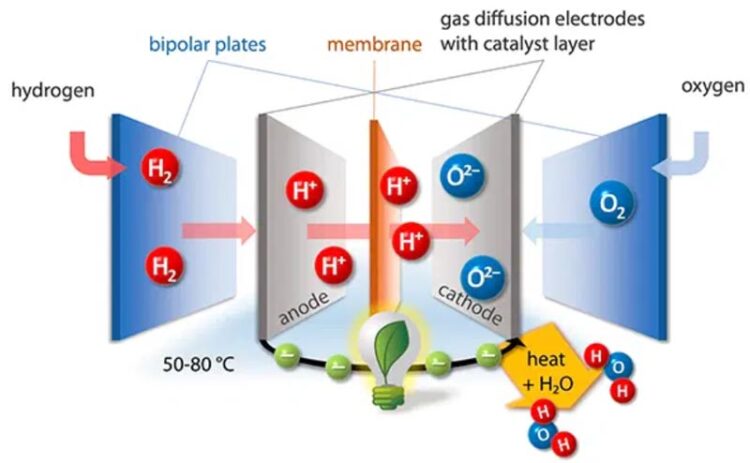Internationalisation of sustainable hydrogen technology

Functional diagram of a PEM fuel cell.
(c) Andreas Rosin, University of Bayreuth
Green hydrogen and fuel technology are a new focus of the Export Initiative Environmental Technologies (EXI). The University of Bayreuth has recently become involved in this funding programme of the Federal Ministry for the Environment, Nature Conservation, Nuclear Safety and Consumer Protection (BMUV) with its “ECO-FCGen – decentralized power generator based on fuel cells” project. The aim of the project is to build two electricity generation prototypes based on green hydrogen in Germany and India. Research partners are CBC GmbH & Co. KG in Ibbenbüren and the Fraunhofer Institute for Manufacturing Engineering and Automation (IPA) in Stuttgart.
Media Contact
All latest news from the category: Power and Electrical Engineering
This topic covers issues related to energy generation, conversion, transportation and consumption and how the industry is addressing the challenge of energy efficiency in general.
innovations-report provides in-depth and informative reports and articles on subjects ranging from wind energy, fuel cell technology, solar energy, geothermal energy, petroleum, gas, nuclear engineering, alternative energy and energy efficiency to fusion, hydrogen and superconductor technologies.
Newest articles
Faster, more energy-efficient way to manufacture an industrially important chemical
Zirconium combined with silicon nitride enhances the conversion of propane — present in natural gas — needed to create in-demand plastic, polypropylene. Polypropylene is a common type of plastic found…

Energy planning in Ghana as a role model for the world
Improving the resilience of energy systems in the Global South. What criteria should we use to better plan for resilient energy systems? How do socio-economic, technical and climate change related…

Artificial blood vessels could improve heart bypass outcomes
Artificial blood vessels could improve heart bypass outcomes. 3D-printed blood vessels, which closely mimic the properties of human veins, could transform the treatment of cardiovascular diseases. Strong, flexible, gel-like tubes…





















